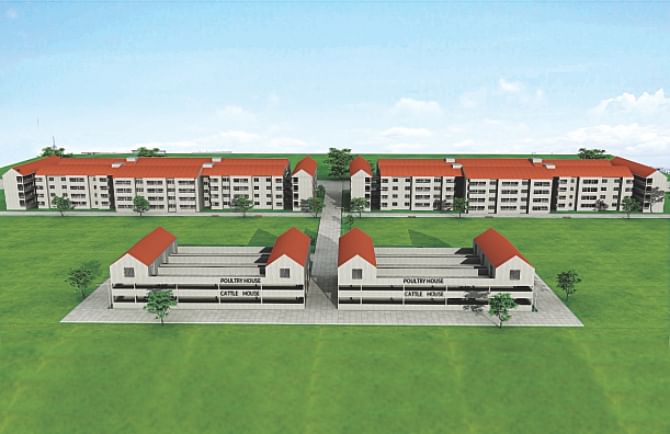New scheme to give villages a new look
New scheme to give villages a new look
Aiming to prevent shrinkage of farmland, govt okays Tk 424cr pilot project; selected villages to get limited urban facilities

The government has taken an ambitious project of setting up new model villages with limited urban facilities to prevent shrinkage of agriculture land.
The Executive Committee of the National Economic Council (ECNEC) yesterday approved the Tk 424 crore “Palli Janapad” project, through which four-storey buildings would be constructed at each village to accommodate the families living there.
Initially, 272 flats in four categories would be constructed under the project in seven villages across the country. The allottee of each flat would pay 30 percent of the construction cost as down payment.
The rest 70 percent would be paid in instalments in 15 years in addition to another 5 percent simple interest on the amount.
After the ECNEC meeting, Planning Minister AHM Mustafa Kamal told reporters that initially they would implement the scheme in seven selected villages on a pilot basis.
“If the project becomes a success, it will be expanded throughout the country in phases,” the minister added.
The buildings will have four categories of flats -- 'A' type flat worth Tk 14.67 lakh value would be of 915 square feet (sft) with three bedrooms and two balconies. The 'B' type flats of 710 sft with a price tag of Tk 11.38 lakh would have two bedrooms and two balconies. The 760-sft 'C' type flats would have two bedrooms and a balcony at Tk 7.38 lakh. The 'D' type flats of 365 sft would have a single bed and a balcony with Tk 5.85 lakh.
The value per sft has been set at Tk 1,603 for each flat, which would also have dining, kitchen and bathroom facilities.
The planning minister said there would also be some common facilities free of cost.
The model villages would have shops, dairy or poultry farms, solar panels, biogas, ATM booths, mobile banking, and playgrounds. Apart from these, Tk 1 crore seed money would be given to each village for providing training facilities to create self-employment opportunities, Kamal said.
The minister said it was a new concept of compact housing project, which would include residential facilities alongside agriculture and forestation.
Mustafa Kamal added, “Our idea is to keep people in the villages and provide them with urban facilities so that they don't migrate to the cities and towns.”
Quoting Prime Minister Sheikh Hasina's deliberations at the ECNEC meeting, the planning minister said it was a dream of Bangabandhu Sheikh Mujibur Rahman.
Hasina said when Bangabandhu had gone to the UK in 1969, he visited a village there and thought of introducing the model in Bangladesh.
Officials at the planning ministry said villages for the pilot project had not yet been selected and would be chosen through a survey.
The premier at the meeting expressed her intention to give some of the land she owns at Tungipara in Gopalganj for constructing flats under the project, the officials said.
Around 3 acres of land would be required for each model village, they added.
Villages would be selected from seven divisions based on some criteria, including inhabitants having a higher tendency towards building houses on agricultural land, a good number of them working abroad and sending handsome amounts of remittance and scope for acquiring necessary land for the project.
The land at the villages would still be in possession of the owners but would be cultivated as cooperatives through organic farming.
Ferrocement and Sandwich panels would be used for constructing the proposed buildings, which would save 37 percent of the cost of traditional building construction.
Ferrocement is a mixture of cement and sand, while Sandwich panel is a type of flat panel comprising two thin aluminium sheets bonded together with a non-aluminium core.
Each of the model villages would save about 13.05 acres of land needed for traditional housing. Besides, 16.26 acres of agricultural land would be saved, as the families would be provided with civic facilities through a single approach road, the project proposal said.
According to the proposal, Bangladesh is losing one percent of its agricultural land every year due to various reasons including population boom.
Binayak Sen, a research director of the Bangladesh Institute of Development Studies (BIDS), told The Daily Star, “To me the projects seems to be interesting… If it succeeds, a good breakthrough will be achieved.”
Sen said the idea had originated from the concept of cluster villages, which would provide urban facilities to villagers and save agriculture land.
He added the project should be implemented in participatory process consulting with the local people.
The poor and low-income group would welcome the initiative, while the richer section might stand against it, the BIDS research director observed.
The planning minister said no-one would be forcibly brought under the project, which would be implemented with consent from everyone concerned.
MA Matin, director general of the Rural Development Academy (RDA), which is implementing the project, told The Daily Star that they would select villages through a survey and a study.
They had already conducted a survey in a village in Bogra, he added.